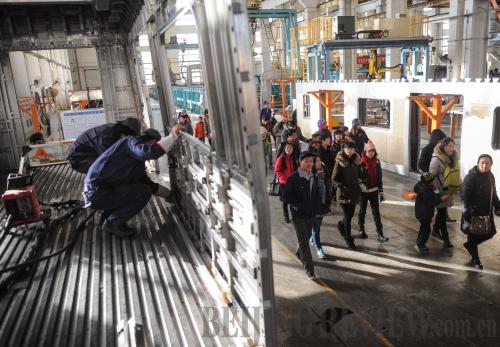|
 |
|
FAST TRANSIT: Young people visit a subway equipment plant in Beijing on December 28, 2013, as part of a public awareness program organized by the city's community youth clubs(LUO XIAOGUANG) |
'Free pies won't fall from the sky," holds a popular Chinese idiom, similar to saying that "there's no such thing as a free lunch" in the West. While it won't be raining pastries any time soon, young people living in Beijing may enjoy free lunches and a lot more by joining a community youth club in their neighborhood.
Community youth clubs are community-based organizations first created by the China Communist Youth League Beijing Committee (CCYLBC), the municipal branch of China's leading youth organization, in 2010. They operate in communities with large numbers of young professionals and residents, so as to help guide them toward enjoying an active and healthy lifestyle.
By 2013, the CCYLBC had set up 350 clubs in 16 districts and counties in Beijing. By the end of this year, it plans to have a total of 500 built. According to the committee's long-term plan, Beijing will have 1,000 community youth clubs, so that every 10,000 youths will have access to at least one in their neighborhood.
Joining the club
Since May, Liu Yanfei, a 27-year-old social worker at the Jimenxinyu Community Youth Club in Beijing's Haidian District, has started to receive applications for joining the club's free adult college entrance examination tutorial classes. This annual exam, for those who did not pass the national college entrance examination but wish to enter tertiary education part-time, will be held in late October this year.
"We have recently been busy preparing for this free and well-received program and accepting applications online and by phone," Liu told Beijing Review. "There are few requirements to join a community youth club. If you are between age 18 and 35, you can participate in all our activities at no expense after signing up in advance."
The tutorial class is just one of many activities organized by Beijing's community youth clubs. According to the latest census, Beijing's population reached 21.15 million in 2013, and serving the now millions of young professionals in this city is an important task. These youth organizations provide both educational and social activities for this demographic within "a fun club and a trustworthy friend circle," so as to widen young people's substantive relationships.
The clubs have attracted many young people from all walks of life—permanent residents, young migrant workers, tourists visiting the city, and senior citizens—because all activities in the clubs are free. Participants can enjoy a free lunch before taking on a relaxing subject, like practicing calligraphy or musical instruments, doing yoga, and belly dancing, or they can challenge themselves by taking classes and attending the lectures of visiting scholars.
"Our activities are open to all young people who apply to join our club, whether they are permanent or temporary residents, in or outside our community," said Liu, the social worker. She added that in the Jimenxinyu Community Youth Club, more participants are part of the city's floating population than permanent residents. "This is an old neighborhood, built in the 1980s and 1990s. Most residents are over 35 years old. But we have a huge wholesale market nearby, where tens of thousands of young business people from all over the country gather," Liu said.
Last year, the number of migrant workers in Beijing reached over 8 million, the majority of whom are young people. Community youth clubs have helped not only enhance the cohesive relationships between these youths, but improve their feelings of acceptance, identity, and participation in the city.
"Many of the people applying for our tutorial classes for the adult college entrance exam this year are from other districts of Beijing, but come to Jimenxinyu thanks to the high quality of our classes," said Liu, explaining that in 2013, out of 28 young people that joined the club's exam tutorial classes, 27 passed. "Such a high pass rate attracted more applicants this year," she said. The club will provide 39 tutorial classes for this year's adult college entrance exam from July 21 to mid-October.
Hosting such classes, however, requires money. Generally, a community youth club's funds come from two sources: government aid and club fundraisers. A club's staff usually includes a director general, full-time social workers, and volunteers. Director generals of all community youth clubs are trained by the CCYLBC, while social workers are recruited for employment. Liu, who is originally from Changzhi, in north China's Shanxi Province, became an accredited social worker last July. She and her colleagues finished recruiting volunteers in late June of this year.
"Volunteers at our club are mostly college students living in the neighborhood. There are several prestigious universities nearby, which is a great advantage for us," said Liu. "The recent volunteer team for our tutorial classes is from the China University of Mining and Technology."
|
